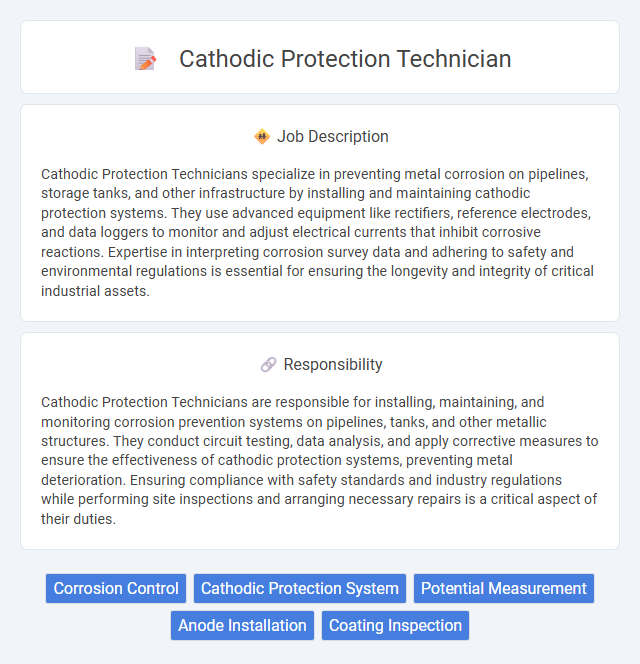
Cathodic Protection Technicians specialize in preventing metal corrosion on pipelines, storage tanks, and other infrastructure by installing and maintaining cathodic protection systems. They use advanced equipment like rectifiers, reference electrodes, and data loggers to monitor and adjust electrical currents that inhibit corrosive reactions. Expertise in interpreting corrosion survey data and adhering to safety and environmental regulations is essential for ensuring the longevity and integrity of critical industrial assets.
Individuals with good physical health and strong attention to detail are likely suitable for the Cathodic Protection Technician role, as the job often involves working in challenging environments and requires careful monitoring of corrosion control systems. People who are comfortable working outdoors, sometimes in confined spaces or at heights, may find this occupation fitting, while those prone to anxiety in such conditions might face difficulties. Candidates with a background in electrical or mechanical systems and a willingness to perform hands-on technical tasks probably have a higher probability of success in this field.
Qualification
Cathodic Protection Technicians require a solid understanding of electrical principles, corrosion control methods, and specialized training in cathodic protection system installation and maintenance. Certifications such as NACE CP Tester or CP Technician are highly valued, demonstrating expertise in monitoring and mitigating metal corrosion in pipelines and infrastructure. Practical experience with electrical testing equipment, data analysis, and adherence to industry safety standards is essential for effective job performance.
Responsibility
Cathodic Protection Technicians are responsible for installing, maintaining, and monitoring corrosion prevention systems on pipelines, tanks, and other metallic structures. They conduct circuit testing, data analysis, and apply corrective measures to ensure the effectiveness of cathodic protection systems, preventing metal deterioration. Ensuring compliance with safety standards and industry regulations while performing site inspections and arranging necessary repairs is a critical aspect of their duties.
Benefit
Cathodic Protection Technicians likely experience significant benefits such as enhanced job security due to growing infrastructure maintenance needs. They may gain specialized skills that increase their marketability and potential for higher wages. Opportunities for career advancement and certifications could also contribute to long-term professional growth.
Challenge
A Cathodic Protection Technician likely faces the challenge of diagnosing and mitigating corrosion in diverse and harsh environments, requiring precise technical skills and problem-solving abilities. The probability of encountering unexpected system failures or environmental factors demands adaptability and thorough knowledge of electrochemical principles. Effective troubleshooting and maintenance under such conditions may be critical to ensuring the longevity and safety of infrastructure.
Career Advancement
Cathodic Protection Technician roles offer significant career advancement opportunities through specialization in advanced corrosion control technologies and project management. Mastery in interpreting electrochemical data and proficiency with state-of-the-art monitoring equipment can lead to supervisory or engineering positions within the industry. Continuous certification and practical experience are essential for ascending to senior technician or consultant roles, enhancing both expertise and earning potential.
Key Terms
Corrosion Control
Cathodic Protection Technicians specialize in corrosion control by applying advanced electrochemical methods to protect metal structures from degradation. They perform system design, installation, and maintenance of cathodic protection equipment on pipelines, storage tanks, and offshore platforms. Their expertise significantly extends the lifespan of critical infrastructure while ensuring compliance with industry standards and safety regulations.
Cathodic Protection System
Cathodic Protection Technicians specialize in installing, inspecting, and maintaining Cathodic Protection Systems designed to prevent corrosion on metal structures such as pipelines, tanks, and offshore platforms. They utilize techniques like impressed current and sacrificial anode systems to enhance the lifespan and safety of critical infrastructure. Proficiency in interpreting corrosion data and performing electrical measurements ensures the effectiveness and compliance of these protective systems.
Potential Measurement
Cathodic Protection Technicians specialize in potential measurement to monitor and prevent corrosion in metal structures such as pipelines and storage tanks. Accurate potential measurements are essential for assessing the effectiveness of cathodic protection systems by detecting voltage differences that indicate corrosion activity. Proficiency with reference electrodes, voltmeters, and data logging equipment ensures proper maintenance and extends the lifespan of infrastructure.
Anode Installation
Cathodic Protection Technicians specialize in the installation of anodes essential for preventing corrosion in underground and submerged metal structures such as pipelines and storage tanks. They ensure precise placement and secure connections of sacrificial or impressed current anodes to optimize the electrochemical protection system's efficiency. Proper anode installation extends the lifespan of critical infrastructure by minimizing metal deterioration in harsh environmental conditions.
Coating Inspection
Cathodic Protection Technicians specializing in Coating Inspection ensure the integrity of protective coatings on pipelines, storage tanks, and industrial structures to prevent corrosion. They utilize advanced techniques such as holiday detection and ultrasonic thickness measurement to identify coating defects and potential failure points. Expertise in interpreting inspection data is critical for maintaining compliance with industry standards and enhancing asset longevity.
 kuljobs.com
kuljobs.com